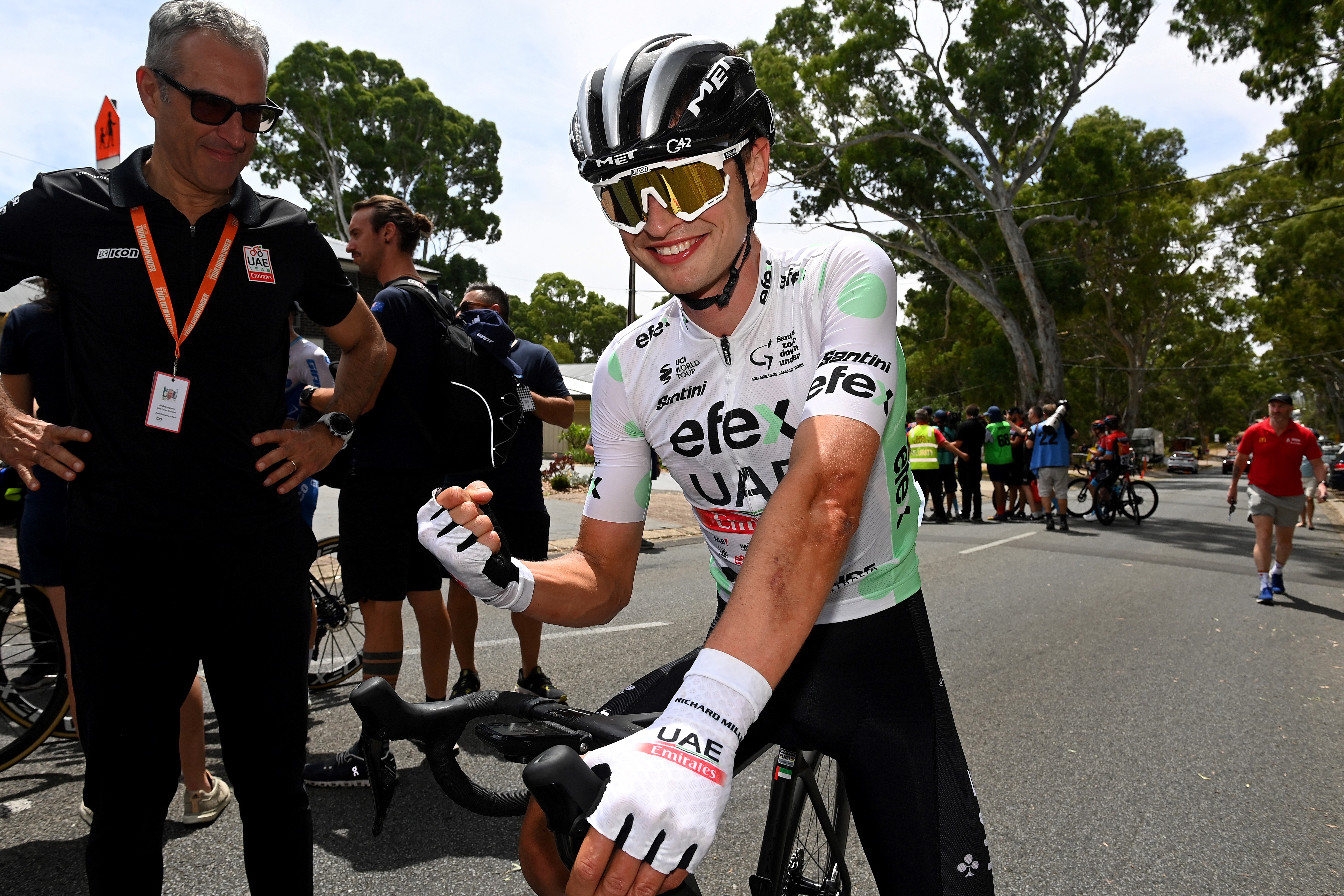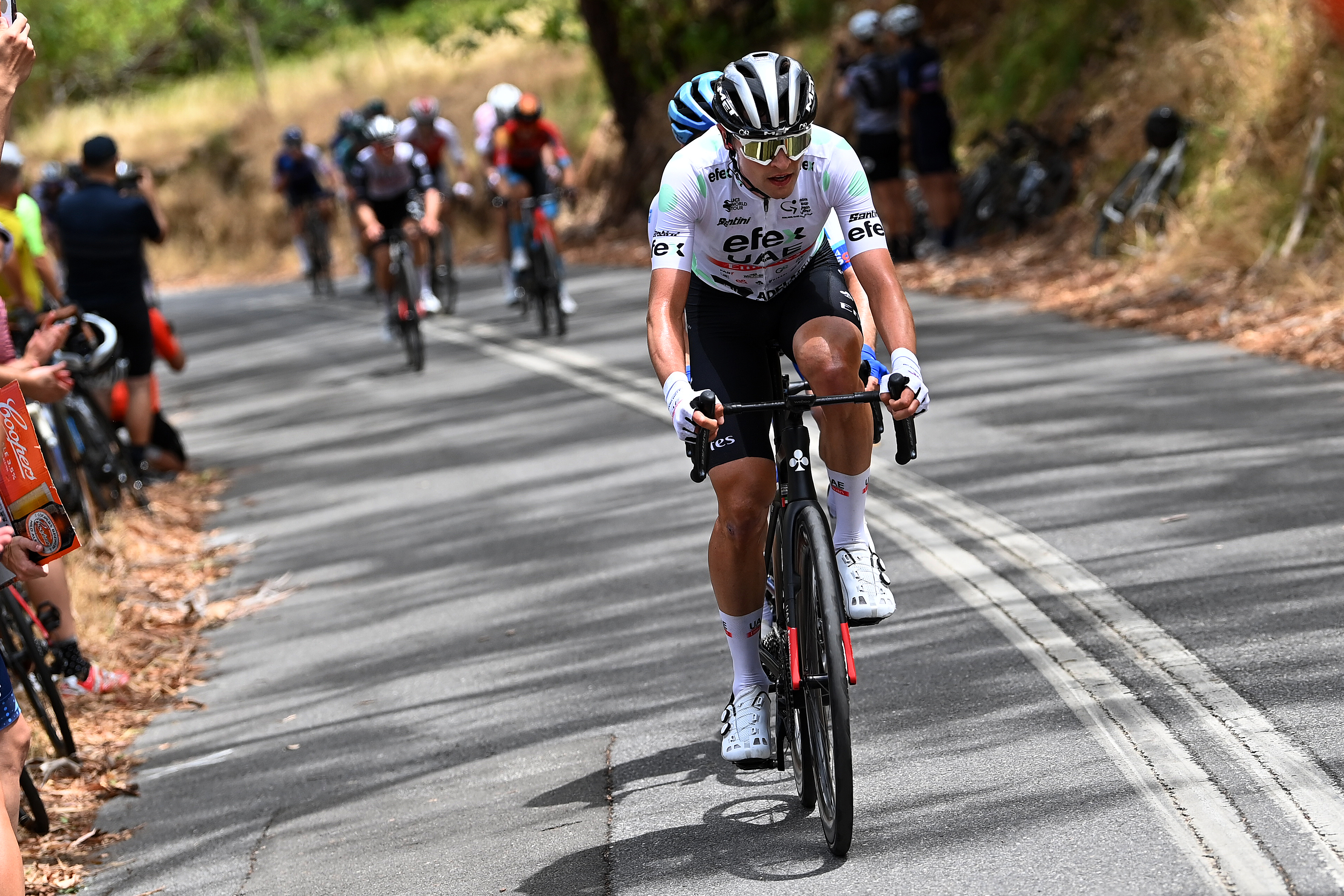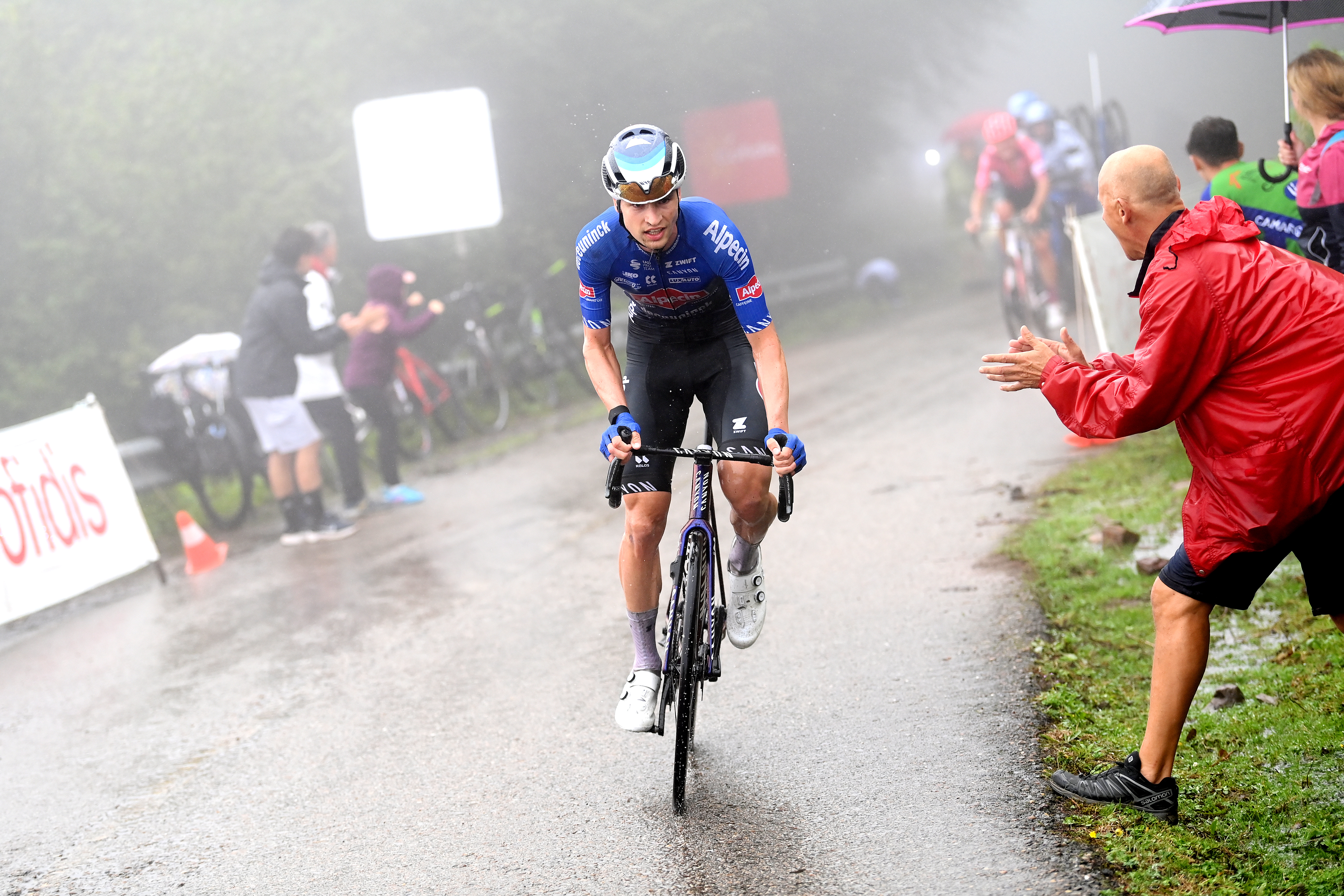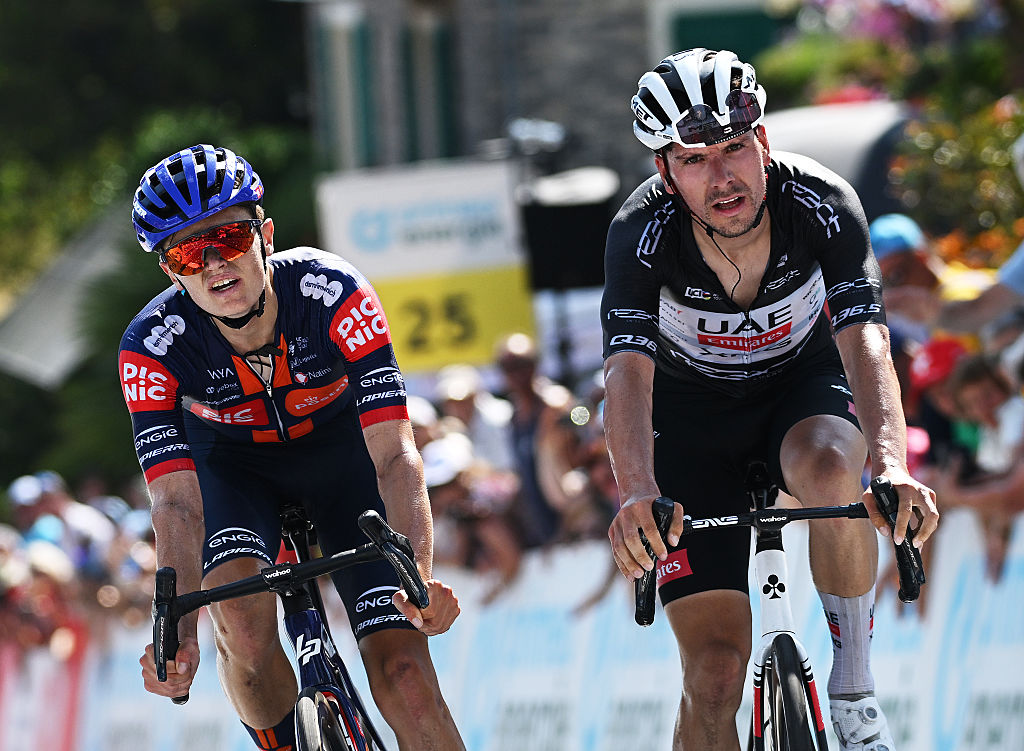Jay Vine: There's a massive difference between the top and bottom teams
How the transfer to UAE Team Emirates changed Australian's Giro d'Italia ambitions

The latest race content, interviews, features, reviews and expert buying guides, direct to your inbox!
You are now subscribed
Your newsletter sign-up was successful
Last October, when Jay Vine was still, officially at least, an Alpecin-Deceuninck rider, the idea of targeting the general classification at a Grand Tour seemed fanciful. Two stage wins at the Vuelta a España had illustrated his gifts in the mountains, but he insisted that three-week racing was about rather more than raw climbing talent.
"I think Grand Tours are a bit out of the question, we just don't have the team to be able to do stuff in the mountains," Vine said then, suggesting one-off exploits would remain the summit of his ambition in three-week races in 2023.
What a difference a transfer makes. Once Vine's long-rumoured passage to UAE Team Emirates was formally confirmed as fact a fortnight or so later, his previous reservations about the Grand Tours quickly seemed to fade. Now, as Vine prepares for his Giro d'Italia debut, there appear to be no set limits on what he might achieve on the road to Rome.
João Almeida, fourth overall in 2020, sets out from Abruzzo as UAE Team Emirates' obvious leader, but Vine, even allowing for the knee injury that interrupted his Spring, will not line out purely as a gregario. His aptitude in the mountains, not to mention the dramatic strides he has made against the watch this season, mean that he will nurture his ambitions of his own in Italy.
"After this injury, coming out of the Giro with a top ten would be incredible for me, but aside from an actual number I'm really looking forward to going through the process of completing a Giro with a GC team," Vine tells Cyclingnews.
"That's something that's completely new to me, and it's also a way to find out more about myself, about how to manage weight, nutrition, energy levels – all of that stuff – much more closely. Weight fluctuations were quite common for me in the two Vueltas I did, for instance."
Alpecin-Deceuninck were the best Pro Continental team in each of Vine's first two professional seasons and this year, they have shown themselves more than worthy of WorldTour status, with Mathieu van der Poel annexing two Monuments. Away from racing, their regimen includes housing riders in atmosphere-controlled rooms on training camps, yet Vine maintains the attention to detail at his new team is on an altogether different level.
The latest race content, interviews, features, reviews and expert buying guides, direct to your inbox!
"There’s a massive difference. For me, coming out of Australia and not having any idea of equipment levels or team budgets, I was a bit shocked"
The expression 'two-speed cycling' has recently made a comeback, and it's not simply because 1990s nostalgia is having a moment. These days, the gross disparity in team budgets means that success in the biggest races – and at the Grand Tours, above all – increasingly appears to be the preserve of an elite caste of WorldTour squads.
Those with the wealthiest backers, UAE Team Emirates among them, stockpile the best talent, but they can also bankroll investments in equipment and preparation that lie far beyond the reach of teams vying simply to stay afloat.
When Team Sky dominated the last decade, many trumpeted the team's 'marginal gains' philosophy without ever deigning to mention the simplest and most obvious competitive advantage of all – a benefactor with deeper pockets than anyone else.
"There's a massive difference. For me, coming out of Australia and not having any idea of equipment levels or team budgets, I was a bit shocked," Vine says. "I came out of Australia thinking everyone had access to all the same equipment, testing, setup, ethos, dieticians, training, psychologists, everything…
"But no, there is a massive difference in level between the top teams that put the money into those things – or the top riders, who have the salaries to be able to do their own stuff – compared to the bottom end of the sport.
"The level of preparation does determine the results you get. And at this stage, even a 1% difference across a Grand Tour could be five or six minutes. So if you're talking about a few one-percenters, they definitely add up."

Vine points to his surprise victory in the time trial at the Australian Championships as a case in point. In his first two seasons, he could only roll his eyes when it was suggested he could improve against the watch by spending more time on his time trial bike. If only it were so simple.
"There's no point in just going really hard but going slow," Vine said last year. "You have to practice by going in a wind tunnel."
On joining UAE, he finally did.
"At the national championships, if I had to ride the position that I had with Alpecin at last year's Vuelta, I would have been tenth. I would have lost three minutes to myself just purely based on my position," Vine says.
"The difference you can see between the two teams is markable. UAE have tested every combination of tyre width and pressure in the tunnel, and they've changed tyre sponsors purely on performance.
"But even if you just look at the position: before this year, I hadn't been near a wind tunnel, I hadn't even been near a modern bike fit set-up. My hands were low and there was a massive gap between the chin and the chest.
"It was slow and in modern cycling, we're talking 50, 60, 70 watts… Even Ganna would struggle to win that time trial with that watt difference."
Training in Sierra Nevada
Vine made the fastest of starts to life at UAE Team Emirates, with his national time trial title quickly followed by overall victory at the Tour Down Under. His season ground to a sudden halt, however, when he picked up an injury to his right knee in training ahead of the UAE Tour.
He lasted just two days there before withdrawing with patellofemoral pain. The prescribed remedy was straightforward but no less frustrating for it. After a week of complete rest, Vine was limited to a few more of low-intensity indoor riding before he could resume full training on the road.
By then, objectives like Tirreno-Adriatico and the Volta a Catalunya had come and gone, but Vine's plans to make his Giro debut remained on track. After convalescing at home in Andorra, the Australian has been training with his UAE team at Sierra Nevada in recent weeks, and he maintains that his recent lack of racing should not prove an impediment. He went some 10 weeks without competitive action last summer, after all, before he lit up the Vuelta a España.
Vine's methodology has, however, changed slightly since he joined UAE, where he is now coached by Jeroen Swart. On paper, a 27-year-old, relative newcomer to the top level with apparently ample margin for improvement should be a coach's dream project. The reality, Vine jokes, might not necessarily tally with that impression.
"I think he thinks I'm a bit of a headcase because I keep coming and asking him questions instead of just doing the work. I like to know what I'm doing and why… I'm not the easiest guy to coach in that sense," Vine says. "But once I know why I'm doing something, I will complete the work until it's done, and I've really liked Jeroen's methodical training approach.
"I've started doing a lot more strength, low cadence work instead of a lot of gym work. I used to hate the low cadence stuff, but I've definitely noticed a difference since incorporating a lot of it into my training. It saves on gym memberships, though it means you have to change your training cassette more often…"
Taking on the Giro d'Italia

And so to Italy. When Vine sat down with Cyclingnews at the end of last season, he cited the 70km of time trialling on the Giro d'Italia route as a reason not to take any concerted aim at the general classification.
The flat time trials that bookend the opening week seem rather different, of course, now that he rides in the skinsuit of Australian champion. His precise role at UAE will only be fully defined as the race progresses, but a tilt at the overall standings is a distinct possibility.
"At this stage, I've never done GC at a Grand Tour, and there are lots of different things to take into account. And obviously, there's the age-old chestnut of luck being involved," Vine says.
"I think keeping the team's options open through the three weeks is a plan, but my form coming out of the altitude camp will ultimately dictate what the team uses me for – whether they use me aggressively or defensively, or whether I'm there in a supporting role from day one."
The 18.4km time trial to Ortona on the opening day might reveal much about Vine's prospects over the following three weeks. The two opening week time trials might provoke gaps unlikely to be repeated until the dying days of the race when accumulated fatigue begins to weigh more heavily.
"Time trialling is so important these days. Gaining 30 seconds or even just minimising losses to a guy like Remco will be crucial because with the speed we're going up climbs these days, it's really hard to produce the watts you need to ride away from someone on there unless you're getting into gradients of 10, 11 or 12%. It's a big advantage if you don't need to take back time on the road stages.
"I've always liked time trialling and now that I've got a set-up that's quite fast, the time trials are something I'm really interested in. I think the route suits me, and it definitely suits guys like Geraint Thomas. At this Giro, if he can get anywhere near where he was at the Tour last year, then there might be a big gap between first and second."
“If you crack, you could lose two and a half minutes in the final time trial alone"
With Remco Evenepoel and Primož Roglič the obvious favourites for the Giro, mind, it is tempting to draw parallels with last year's Vuelta, where the Belgian took advantage of the stage 10 time trial to Alicante to build up what proved to be an unassailable lead. Vine, however, notes that the opening phase of the Vuelta also included some of its toughest climbs – he won atop two of them – whereas its closing chapter was relatively benign, at least in comparison to the horrors Mauro Vegni has crammed into final week of the Giro.
"The third week is the key one, unlike the Vuelta last year, which basically revolved around the first week," says Vine. "That's sort of good for me, because even if you're not coming in with your best form, you should be able to minimise your losses and come out of it in good shape."
Come the Alps, however, there will be no hiding place. Vine knows that the challenge provided by days like the tappone to Tre Cime di Lavarado, with 5,400m of total climbing, is altogether different to those he faced on the Vuelta. The mountain stages there were middle-distance events in comparison to marathon slogs like these.
"I like both styles. The 20-minute, pure w/kg test is sort of my bread and butter from Australia, but living in Andorra you can't go anywhere here without running into a 30, 40, 50-minute climb, so either way is fine," says Vine.
"There's 15,000m of road stage climbing in the final week, so there's plenty of time to be gained and that's what I'm looking forward to. I've never done a proper Grand Tour with big mountain passes back-to-back across multiple days. In the Vuelta, it's been medium mountains or a single high mountain."
Still, in the final reckoning, one lone mountain pass could tip the balance. The time trial up Monte Lussari on the penultimate day has the potential to produce a late, late turnaround to surpass even the 2020 Tour de France. "It's not Planche des Belles Filles, it's worse," Vine warns. "If you crack, you could lose two and a half minutes in the final time trial alone."
Tellingly, the tone of his voice is enthusiastic rather than fearful. Then again, Vine had to wait longer than he would have liked to hit the big time, and he had to endure another detour when he injured his knee this spring. However it plays out, the Giro is an occasion to be relished.
"I'm not doing the Tour, so that's a chance to prepare for the time trial at the Glasgow Worlds in the summer," Vine says. "But the Giro is pretty much the be-all and end-all."

Barry Ryan was Head of Features at Cyclingnews. He has covered professional cycling since 2010, reporting from the Tour de France, Giro d’Italia and events from Argentina to Japan. His writing has appeared in The Independent, Procycling and Cycling Plus. He is the author of The Ascent: Sean Kelly, Stephen Roche and the Rise of Irish Cycling’s Golden Generation, published by Gill Books.
